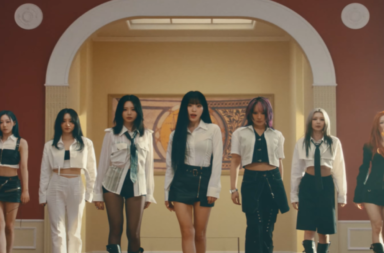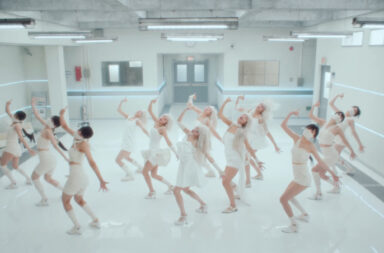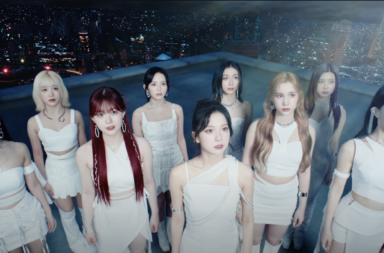“Meet the best reflection of you!”
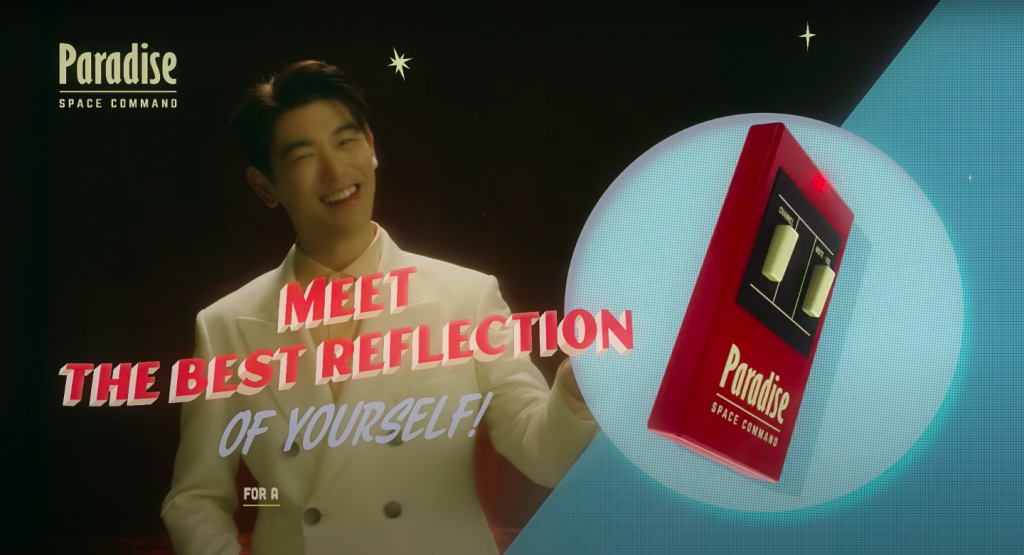
As people living in a loop of sameness and uncertainty brought about by COVID-19, you may be curious to see what exactly this “best reflection of you” is like. And you would not be the only one: Eric Nam’s character in “Paradise,” the soloist’s title track from his newest album, The Other Side, takes up that opportunity to witness the “best” version of himself.
“Paradise” marks Eric Nam’s return to releasing music in Korean after dropping his all-English album, Before We Begin, last fall. The MV also channels a familiar mood found at the height of the summer time and in this pandemic environment. Frustration, the want for something new, and a need for drastic change (hopefully for the better) has been palatable these past few months. In the caption of the “Paradise” MV, Stone Music Entertainment noted that the song ”craves the freedom and hope to escape from the frustrating reality.”
A music video that stands out from Eric Nam’s past releases, “Paradise” intertwines technology, light, and color to tell an unnerving story. Color palette-wise, the MV is quite dark. Earthy colors such as golden yellows, rich greens, and deep blues hint at important elements in the video that are connected to Eric Nam’s repetition of the line “lost in this paradise.” The hazy filter over the video draws curiosity, as well as the detail that there is usually only one light source in each scene.
The “inciting moment,” as it may be called, of the narrative of “Paradise” is when the Eric Nam in the living room sees an infomercial on the ’90s TV for a product that promises he will be able to “meet the best reflection” of himself. Prior to this scene, he was seen in his work cubicle, a bored expression on his face as his typed on his old computer keyboard.
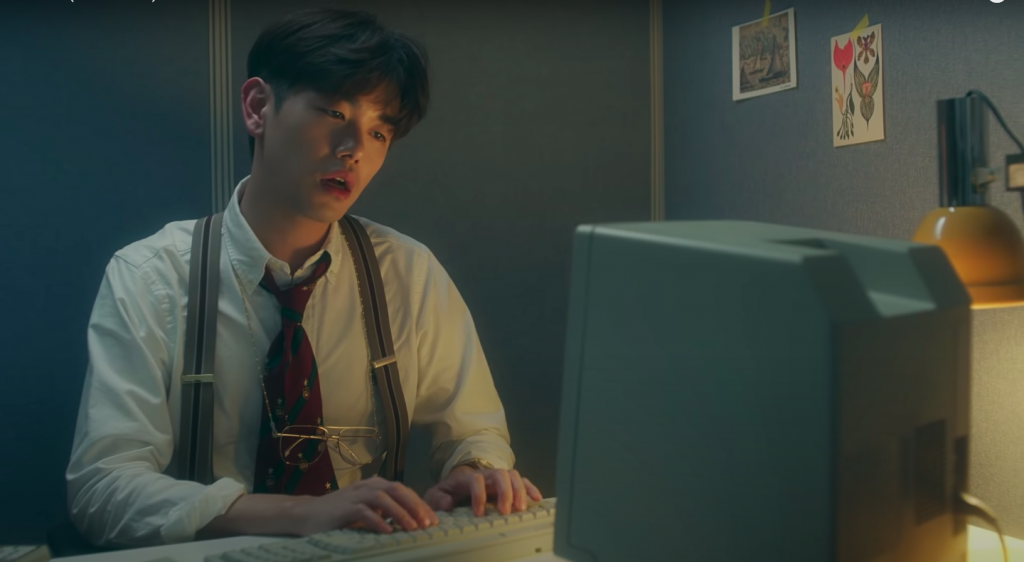
After Eric receives the controller (which has “paradise” in large letters across the bottom of it) and turns on the switch, viewers are immediately transported into the TV screen where a second Eric Nam, dressed in a blue shirt and black pants, looks around at the darkness surrounding him, a little perplexed. There is only a singular spotlight that provides a bright glare of light over him and his environment. Otherwise, this Eric Nam wanders alone as shadows dance around him.
Since this is the place Eric’s character is brought to after flipping the switch to paradise, is this his paradise? Is this Eric Nam dressed in more formal wear the “reflection of the best” him? The MV adds more complexity by transitioning to a more traditional paradise set as Eric pulls back a dark curtain—a room filled with various flora and fauna and a glow of warm light. Still wearing the outfit from the previous scene, Eric meets another version of himself, who is clothed in a suit with a daring floral pattern.
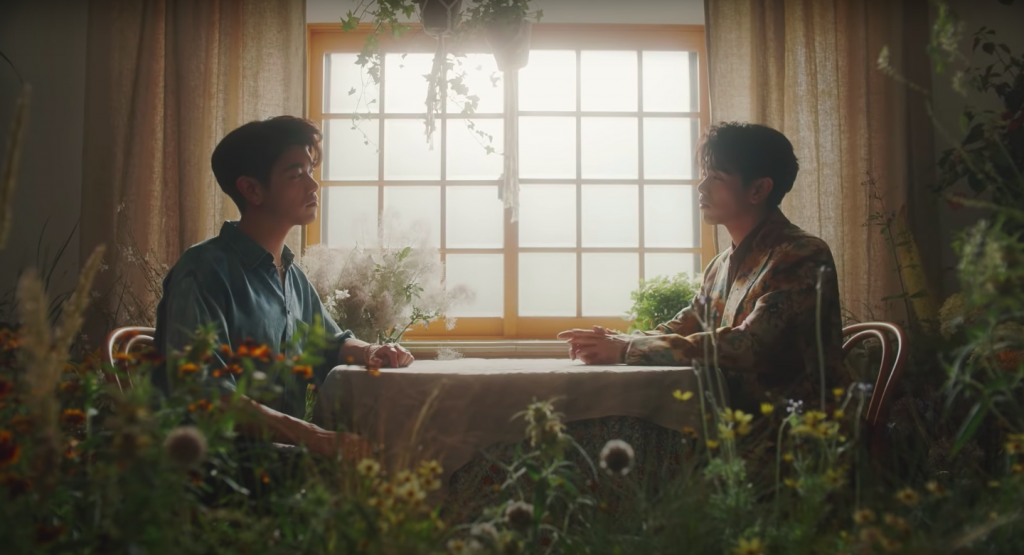
The two face each other at the table in front of the window, which appears to be the only light source but that light is muted (and is it even natural light?). The second Eric Nam slides the former the tray with a teapot and a slip of paper with something written in calligraphy on it. The first Eric Nam quickly deposits that piece of paper into his shirt’s pocket but not before the audience is given a semi-clear shot of what it says: “vis ta vie.” This French saying meaning “live your life,” when paired with the exploration of “paradise,” plays a curious role in the MV.
The many Eric Nams in the video and the viewers are given two opposing mantras. There is the “meet the best reflection of you” from the infomercial, which is presented by a wide-smile Eric Nam on the television set and “live your life,” which is hidden away as soon as it is noticed in a place that may be synonymous with paradise. The conflicting messages and this notion of “paradise” is what the real Eric Nam battles against.
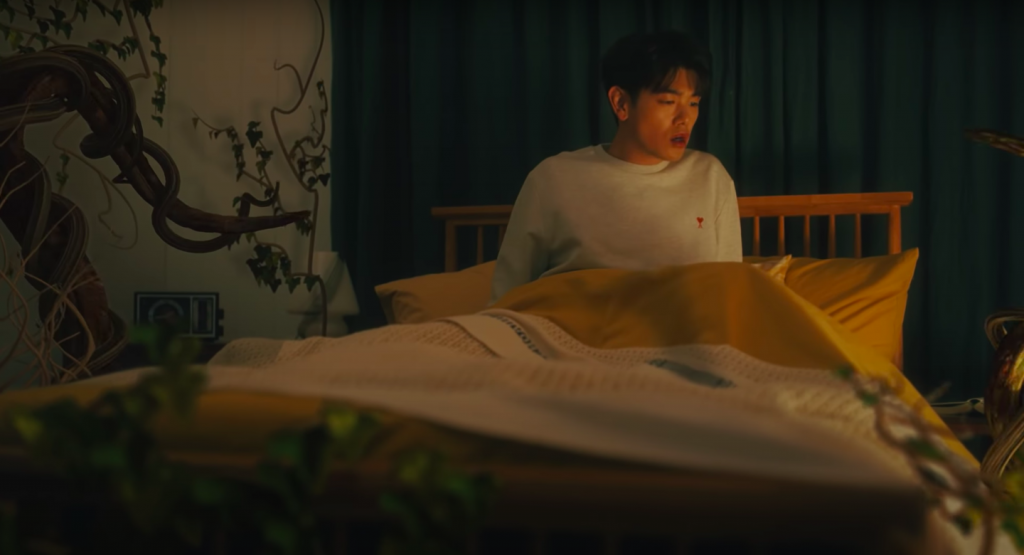
The blue-shirted Eric Nam then drinks the tea placed in front of him in paradise. He literally falls out of the place back into his bed after getting knocked out by the beverage. Yet, though this Eric is no longer in that version of paradise, the elements from it find him. Paradise may be a nature-filled place, but those same things can also be the foundation of the creation of a hell. As Eric lies in bed, he witnesses tree roots breaking through his walls and his floors being covered with unwelcome dirt and vegetation when a lamp—the one light source of the room—falls over.
Although many different Eric Nams are seen in this MV, and some which are exact clones of him, he is always alone. There is no one else around but the many versions of himself. In addition, the places that these Erics show up are all solitary spaces: he is stuck in his cubicle and cut off from the rest of the office in the opening scene; he is surrounded by his clones and their multitude of expressions in the movie theater; and he is very much so alone in his living room, a situation many may be familiar to some during this pandemic. While there are a variety of Eric Nams, each could be a piece of who the overall “Eric Nam” is, from the tired work Eric Nam, the upbeat infomercial Eric Nam, and the comfortable private Eric Nam.
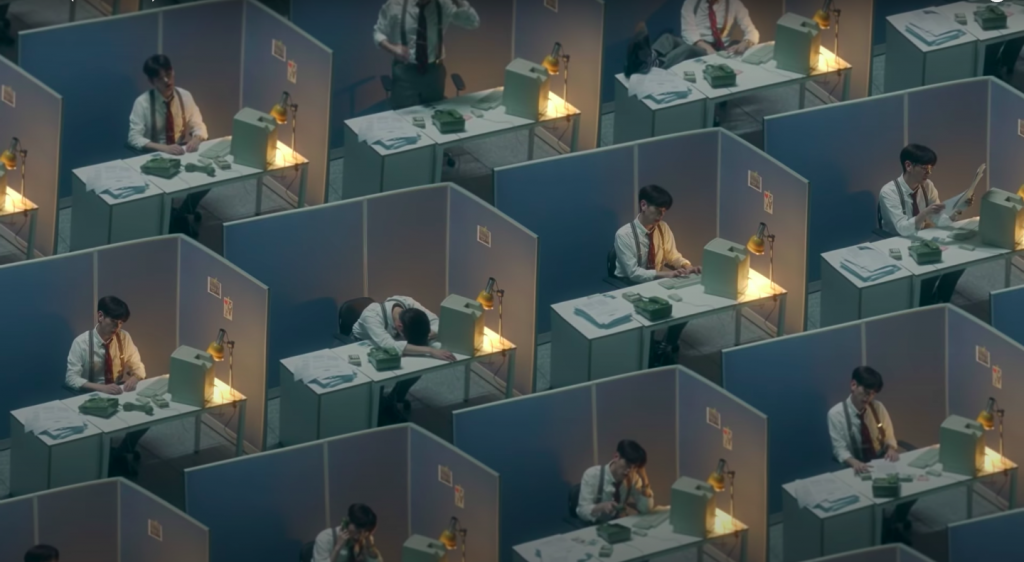
The bridge of “Paradise” ushers in a turning point for the narrative. This time, the blue shirt version of Eric Nam is confronted by his reflection in the same dark space he was in when living room Eric switched on the remote. In a simple but haunting way, the camera moves around this Eric Nam and his reflection in the gold-framed mirror.
Viewers take in his many angles and the copy of this same version of him on the other side of the mirror; yet, one can only see both figures from the waist up. It is a crucial moment for the story as Eric is realizing that he cannot “meet” his “best reflection” without actually considering who he is to himself first. There are no flowers nor golden glow around him; there is only him, his reflection, and the spotlight behind him.
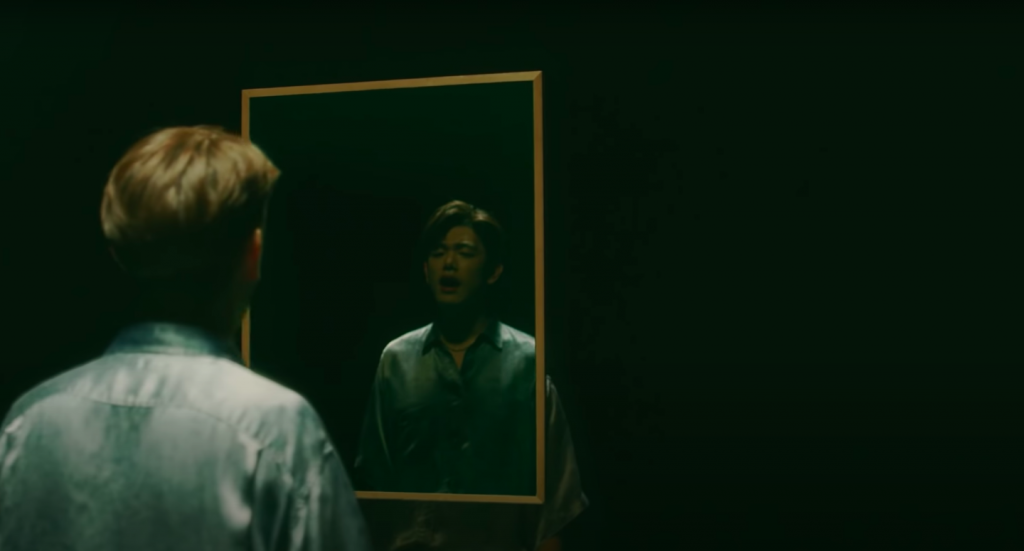
Just as the bright light exposes Eric Nam’s shadows, the “Paradise” MV reveals the nightmarish side of this concept. While the original Eric Nam was enticed by the informercial’s promise of showing him his “best reflection,” it backfired and made him experience the dark side of paradise. When he falls from paradise and into his bed, the shadows of the tree roots creep towards him as if they were going to attack him.
In a desperate effort to escape, Eric pulls the duvet over his head and finds himself back in the dark set. He tries to move in different directions, but each time he is stopped by explosions of sparks. A few seconds later, the camera shifts to the infomercial version of himself in the white suit. That Eric holds the product the original Eric Nam bought, and the lettering from the commercial, “meet the best reflection of you!” dominates the screen so much that part of the phrase is cut off. He is no longer smiling; rather, he is bathed in a greenish light and surrounded by sparks, creating a more sinister feeling.
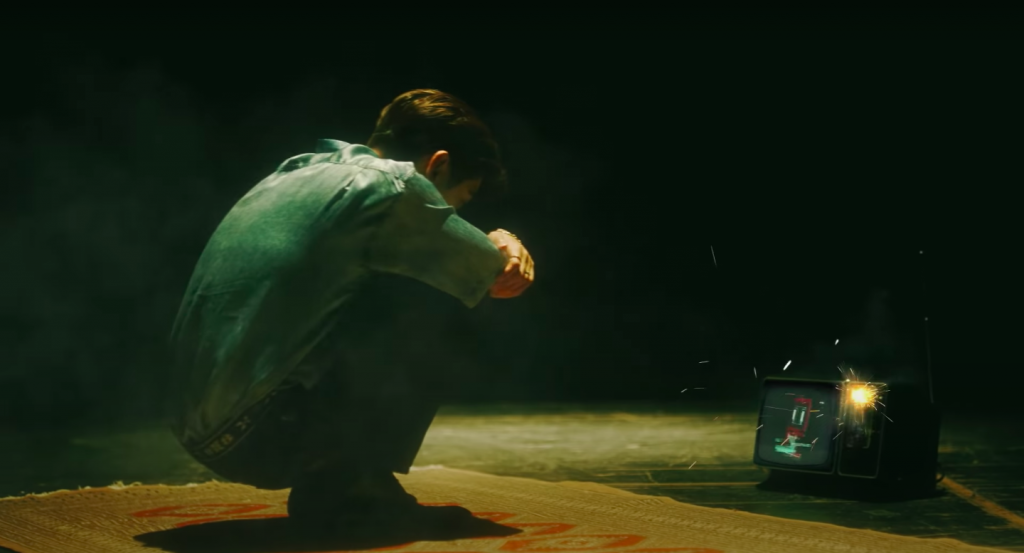
As the narrative unravels, questions arise. What is “paradise,” then? Does it even exist? If it does, is it something to be desired? Furthermore, what does “living your life” mean? Who dictates that?
The MV gives an answer in the last few seconds. The whole story viewers just witnessed rewinds through quick cuts that are accentuated with flashes of light to the moment where Eric Nam is in the living room considering whether or not to pick up the device he had ordered. In the end, he closes the package after eyeing it with a bit of wariness and leaves it in the room. The real Eric Nam decided not to flip the switch, as he recognized that he also does not need to be told nor shown the “best reflection” of himself through a TV screen.
Once again, Eric Nam’s versatility and his relatability as an artist is proven through the “Paradise” MV. It also gives a visual representation to “the other side” you may not see in a person’s life. Eric Nam introduces one of these sides of him through the layers of “Paradise,” which presents a complex narrative with a simple message.
(YouTube. Images via Stone Music Entertainment.)
